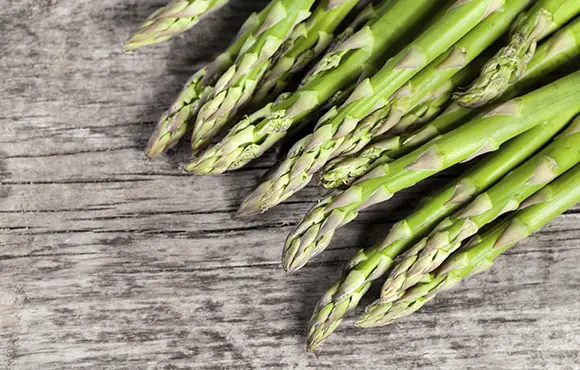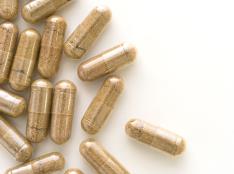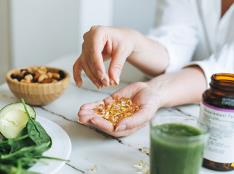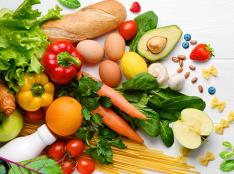We spoke to two nutritional experts—Kelly Hogan, MS, RD, CDN and Clinical Nutrition Coordinator at Mount Sinai Hospital, and Katie Casto Hynes, a Louisville, KY-based Registered Dietitian and 2:51-marathoner—to pinpoint which seasonal foods to put on your grocery list.
Asparagus
1 of 8
Asparagus is one of the first vegetables to pop up at a spring farmer's market, and Hogan urges runners to take advantage of it.
"Asparagus contains the powerful antioxidant glutathione, which helps repair the oxidative damage that occurs in muscles after long, hard runs and can reduce recovery time," she says.
Asparagus also contains inulin, which is a type of fiber and prebiotic. It can help stimulate the growth of probiotics or the "good" bacteria in the gut.
Hogan, who is training for the 2016 Boston Marathon, knows how vital these good bacteria can be. "They can keep our immune systems strong and healthy, which is so important during hard training weeks," she says.
Strawberries
2 of 8
Perfect any time of day, strawberries "pack a good nutritional punch with high levels of polyphenols and vitamin C, both antioxidants that can help repair damage to muscles after hard workouts," Hogan says.
Strawberries are also a good source of potassium, so they can replace what's lost of the mineral in sweat during hot or hard runs. Hogan recommends adding the berries to a post-workout recovery smoothie, oatmeal or Greek yogurt bowl.
Hynes also loves this springtime berry, "Strawberries are naturally sweet, yet low on the glycemic index with their high fiber content," she says. "There are no spikes in blood sugar from this favorite fruit. Also, the berry is bursting with vitamin C, which is vital for tissue repair, and anthocyanins, a type of antioxidant with protective effects against heart disease and cancer."
Salmon
3 of 8
Fruits and veggies aren't the only thing on the menu this spring. Now is also prime-time for salmon.
Hogan says the fish is an excellent source of DHA and EPA, types of omega-3 fatty acid most commonly associated with reducing the risk of cardiovascular disease and promoting better brain health.
"DHA and EPA also have excellent anti-inflammatory properties, which are especially important for endurance athletes as our bodies have higher levels of inflammatory markers after prolonged strenuous activity, like long runs and marathons," she says.
And for runners who don't consume dairy, Hogan says salmon is a good source of both calcium and vitamin D, which are vital for bone health.
Eggs
4 of 8
When it comes to quick and easy meals (and really, who feels like cooking after a long run?), eggs are a top choice.
"Eggs are a fantastic source of high quality protein, which can aid in post-run muscle recovery and promote satiety for the always ravenous runner," Hogan says.
And since most of the egg's vitamins and minerals are in the yolks, it's important to eat the whole egg. If you're worried about high cholesterol, there's no need to fear the yolk, according to Hogan.
"New 2015 Dietary Guidelines removed previous recommended restrictions on dietary cholesterol, as it has been found to have little effect on serum cholesterol," she says.
Potatoes
5 of 8
It's no secret that runners love carbs, but if you're looking for something besides the usual pasta and bagels, it may be time to seek out spring potatoes. Spuds often get a bad rap, but Hynes urges runners to give them a second look.
"They're high in potassium, vitamin C, vitamin B6 and complex carbs," she says. "Spring potatoes are a great food for refueling the muscles post-run."
And when you're sweating more than usual in those warmer spring temperatures, potatoes can help.
"Vitamin B6 promotes red blood cell formation and is important in maintaining sodium-potassium balance," Hynes says.
Spring Onions and Garlic Scapes
6 of 8
As a competitive marathoner who also advises athletes on proper nutrition and training, Hynes knows all about tired legs.
"As an athlete, fatigue and inflammation can be tough to overcome," she says.
To combat these common training woes, she recommends cooking with anti-inflammatory foods like spring onions and garlic scapes. The sulfur-containing compounds in garlic provide many of its health-promoting effects, so try tossing these spring goodies into your next stir fry or soup.
Spinach
7 of 8
While all greens pack great nutrition, Hynes says that spinach is truly a powerhouse food.
"It's loaded with important micronutrients such as iron, calcium, folate, magnesium and vitamin K, and is also rich in antioxidants vitamins A and C," she says.
Hynes recommends enjoying a giant spring salad or sneaking some spinach into smoothies, casseroles, soups and mixed dishes. And if your local market doesn't have abundant greens just yet, Hynes reminds runners that, "frozen is just as nutritious as fresh."







Discuss This Article